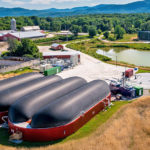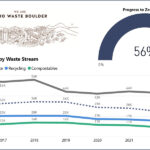Top: The Prince George’s County Organics Composting Facility in Maryland is among processors receiving food waste under the state’s newly effective disposal ban. Photo by Doug Pinkerton
The end of 2022 saw a variety of state and federal legislation relevant to organics recycling get signed into law. Here are some highlights:
- New York State updated its Hazardous Packaging Act to prohibit intentionally added PFAS (Per- and polyfluoroalkyl substances) in packages or packaging components that are intended for direct food contact and are comprised mainly of paper, paperboard, or other materials originally derived from plant fibers. Examples include cups, wrappers, pastry boxes and pizza boxes. Consumer goods such as packages of paper plates, cups or bowls that are distributed, sold, or offered for sale at retail locations are also covered under this law, which became effective on December 31, 2022. Retailers and food service establishments must determine whether the packaging items that they are distributing, selling or offering for sale will need to comply with the PFAS restrictions in the law. California also bans the sale of paper food packaging made with intentionally added PFAS and prohibits companies from using misleading claims about items being free of such chemicals.
- In Michigan, Gov. Gretchen Whitmer signed House Bill (H.B.) 4454-4461 into law, a package of eight bills designed to update the state’s recycling and waste collection practices. Included in the package is H.B. 4460, which requires composting facility operators to meet new standards and requirements, including metrics reporting. The Michigan Department of Environment, Great Lakes, and Energy (EGLE) will be updating its current composting regulations — including for food waste recycling — in 2023.
- The Maryland Department of Environment (MDE) issued regulations in December as part of the implementation of the state’s food waste diversion law that became effective on January 1, 2023. The law applies to schools, businesses, organizations and manufacturers of “human food” that generate at least 2 tons/week of food waste. The regulations go into detail on how to calculate the quantity of food waste generated, and allowed diversion pathways, including food waste prevention, donation, composting, and anaerobic digestion. The Maryland law has a “proximity” clause; it only applies if there is a processor, e.g, composting site, depackaging facility or anaerobic digester, within 30 miles of the food waste generator. Edible food to be donated may remain in its packaging to ensure food safety; otherwise, food waste must be separated from its packaging unless it is going through depackaging equipment prior to recycling. In 2024, generators of 1 ton/week of food waste will need to start complying with the law as well.
- At the federal level, the Food Donation Improvement Act (FIDA) was passed by Congress in December and signed into law by President Biden on January 5. According to the Harvard Food Law and Policy Clinic (HFLPC), the law builds on the Bill Emerson Good Samaritan Food Donation Act (passed in 1996), which provides civil and criminal liability protection both to food donors and nonprofit intermediaries. “The FDIA will enhance the coverage of the Emerson Act by expanding liability protection in two ways that will support modern food donation,” explains a blog written by Sophie DeBode, a HFLPC student. “First, the FDIA will extend liability protection to donations offered to recipients at a good Samaritan reduced price that is not greater than the cost of handling, administering, harvesting, processing, packaging, transporting, and distributing the food. Currently, the Emerson Act only protects food donations if the final recipient receives the food for free. Second, the FDIA will extend protections to certain donations given by food businesses … already required to comply with food safety requirements, directly to those in need. Currently the law only protects food donors who donate food to a nonprofit organization which distributes the food to food-insecure individuals. By also protecting direct donations to those in need, the FDIA will increase efficiency, reduce costs, and enable consumption of perishable food.” This enables pick up of food directly from local restaurants, grocery stores, schools and other sources.













